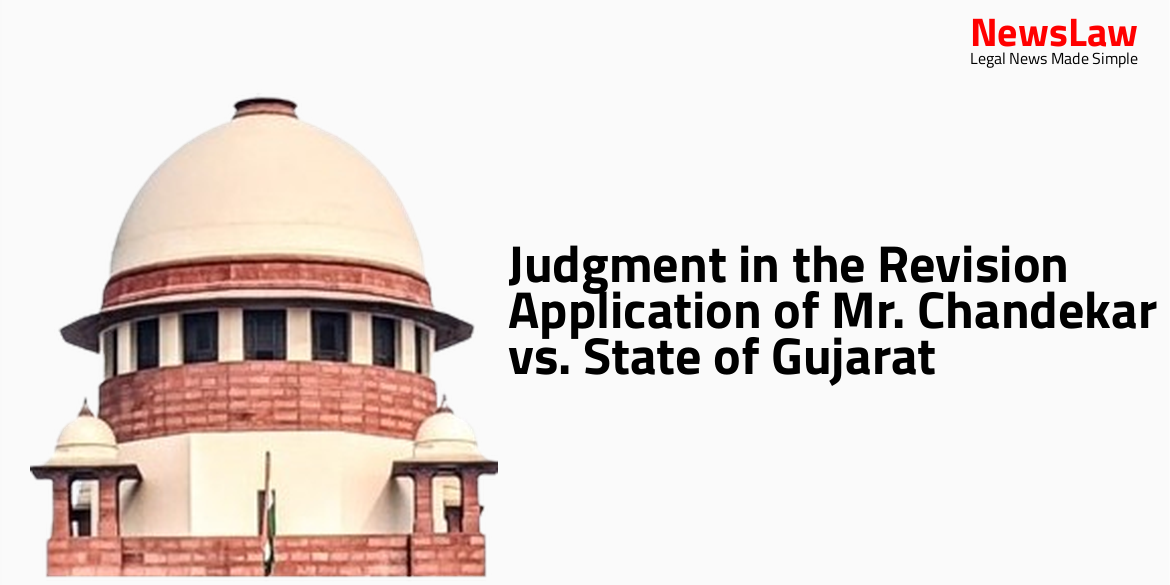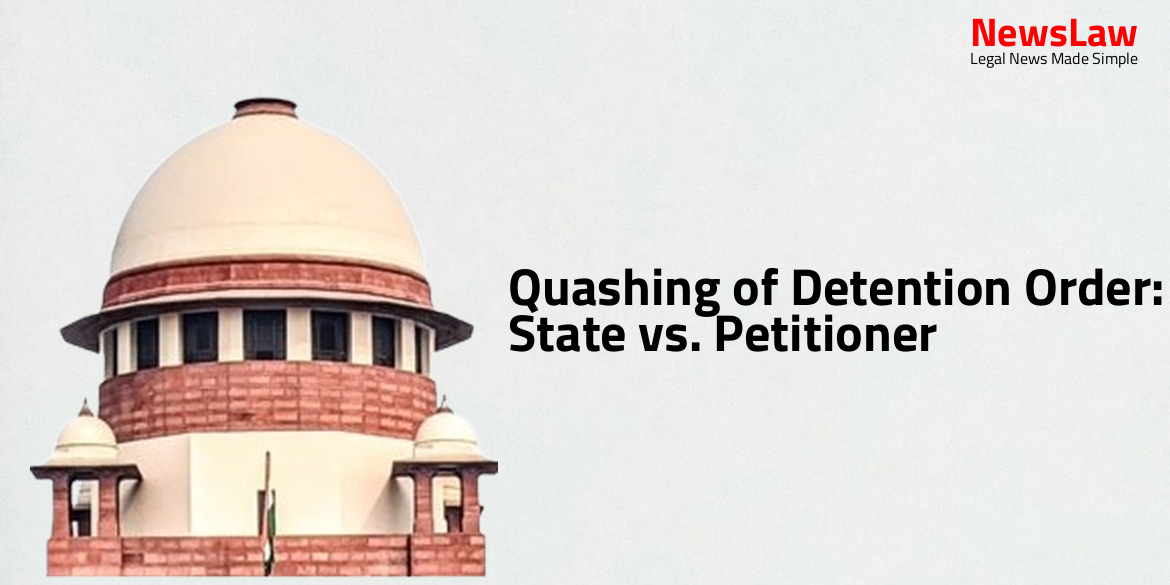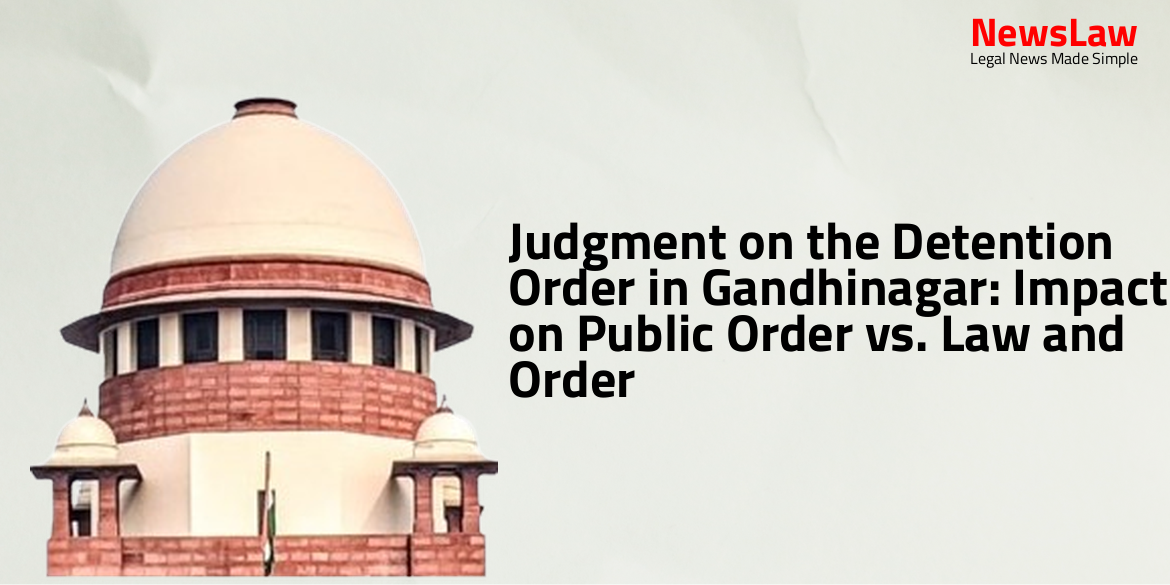The Gujarat High Court recently issued a significant judgment in the Revision Application of Mr. Chandekar vs. State of Gujarat. The court has decided to quash the previous order and remand the matter back to the Appellate Court for a fresh decision. This ruling marks a crucial development in the legal proceedings involving Mr. Chandekar and the State of Gujarat.
Facts
- The Revision Application challenges the concurrent findings of the CJM Vadodara convicting the petitioner under section 409 of IPC.
- The CJM convicted the petitioner for 7 years of simple imprisonment and imposed a fine of Rs. 5,000 for the offence.
- The Sessions Court upheld the CJM’s judgment and dismissed the appeal filed by the petitioner.
- The petitioner then filed a Criminal Appeal before the Appellate Court which was also dismissed.
- The conviction was based on oral and documentary evidence presented before the CJM Vadodara.
- A complaint was lodged against the present appellant under section 409 of 1.P.C. for not providing the account of a significant amount from the Nazir’s custody.
- A charge sheet was filed after the investigation at Chotaudaipur Police Station.
- The Chief Judicial Magistrate summoned the appellant after receiving the charge sheet, and the appellant refused to accept the charges, leading to the framing of charges by the Hon’ble C.J.M.
- During the tenure of the appellant as the Nazir & C.O.C. at Civil & Judicial Magistrate’s Court Chotaudaipur, a significant amount of cash, silver ornaments, and a wrist watch were found missing during a surprise visit by the District Judge.
- The missing amount totaled to Rs. 85,465.92 i.e. rupees eighty-five thousand four hundred sixty-five and ninety-two paise.
Arguments
- The argument of the petitioner’s advocate highlights several key issues in the case.
- The Trial Court and the Appellate Court are accused of committing errors in evidence appreciation.
- Specific instances of oversight by the learned Courts are pointed out, such as the conduct of Mr. Chandekar.
- The conduct of the JMFC raises suspicion, yet the Appellate Court did not consider this in favor of the accused.
- Doubts in the prosecution’s evidence were not interpreted in favor of the accused as per criminal jurisprudence standards.
- The exceptional jurisdiction under section 397 read with section 401 of Cr.P.C. is emphasized by the petitioner’s advocate.
- Key events during the surprise checking are discussed to show gaps in the prosecution’s case.
- The duty of the Appellate Court to re-appreciate evidence independently is highlighted.
- The prosecution’s failure to establish guilt beyond a reasonable doubt is underscored as a critical aspect in the case.
- Accused is 85 years old.
- Three prosecution witnesses are consistent in establishing the case.
- Valuable muddamal was found missing and accused deposited an amount equivalent to its value.
- Argument made regarding the FIR being filed by learned JMFC.
- Request to allow the Revision Application and remit the matter for fresh disposal.
- Allegation that the Appellate Court did not re-appreciate the evidence independently.
- Claim of committed patent illegality by the Appellate Court.
- Opposing view by the learned APP regarding the limitation of revisional jurisdiction.
- Presumption against the accused due to missing valuable muddamal.
Analysis
- The Court cannot re-examine evidence extensively but can examine findings for avoiding miscarriage of justice.
- The Appellate Judge’s bias is hinted at by not allowing a crucial question in cross-examination.
- The conduct of Mr. Chandekar, learned JMFC, raised suspicion as he opened the muddamal room without proper authorization.
- The Appellate Court failed in its duty by not properly addressing doubts and suspicions raised during the trial.
- The verification process of valuable and non-valuable muddamal raises questions about Mr. Chandekar’s actions.
- The discrepancy in the actions of Mr. Chandekar without a proper order is a key point of concern in the case.
- The Appellate Court did not follow proper criminal jurisprudence guidelines in handling the case.
- The failure of justice is noted due to oversight in examining critical evidence and actions of Mr. Chandekar.
- The central aspect of Mr. Chandekar’s unauthorized actions and their impact on the case needs further scrutiny.
- The Appellate Court did not frame appropriate issues based on arguments presented, impacting the fairness of the trial.
- Discretion in the exercise of revisional jurisdiction should be exercised within the four corners of the section whenever there has been a miscarriage of justice in any manner.
- Revisional jurisdiction should not be lightly exercised as it cannot be invoked as of right.
- An appeal against conviction must be disposed of with a reasoned order as failure to give reason amounts to denial of justice.
- Discussion of evidence after it being re-examined is expected from the learned Appellate Court.
- In an appeal against conviction, the appellate court must address itself on both the question of law and questions of facts.
- The Court in revision can consider material only to satisfy itself about the correctness, legality, and propriety of the findings, sentence, or order.
- Revisional court may be exercised suo motu and there is no bar of limitation when exercised in such a manner.
- The very object of conferring revisional jurisdiction upon the superior criminal courts is to correct miscarriage of justice arising from a misconception of law or irregularity of procedure.
- While hearing an appeal, the appellate court should consider whether the conviction is based on proof or merely on suspicion, as suspicion, however grave, cannot be a substitute for proof.
- Any person convicted for more than seven years can appeal to the High Court
- Different courts have different appeal processes based on the severity of the sentence or the type of trial
- There are specific timeframes for disposal of appeals in cases of certain sections of the Indian Penal Code
- The Appellate Court is expected to review both legal and factual aspects of the case
- Section 397 of CrPC empowers the High Court or Sessions Court to review findings and orders of lower courts
- Section 374 of CrPC allows appeals from convictions held by the High Court to the Supreme Court
- The Court finds consideration in the present Revision and decides to allow it.
- The matter is to be remitted back to the learned Appellate Court for fresh decision on appeal.
- The crucial aspect that goes to the root of the matter was not noticed by the learned Appellate Court.
Decision
- The Revision Application is allowed
- Judgment and order dated 03.06.2004 in Criminal Appeal No. 52 of 2000 is quashed and set aside
- Criminal Appeal is remitted to learned Appellate Court for fresh decision
- Condition of the bail bond to be decided by the Appellate Court
- The accused must submit a fresh bail bond of Rs. 5000 and surety of the same amount before the Appellate Court once notice is issued
- Record and Proceedings to be sent back
Case Title: AKBARALI MEHBOOBALI SAIYED Vs. STATE OF GUJARAT
Case Number: R/CR.RA/413/2004



